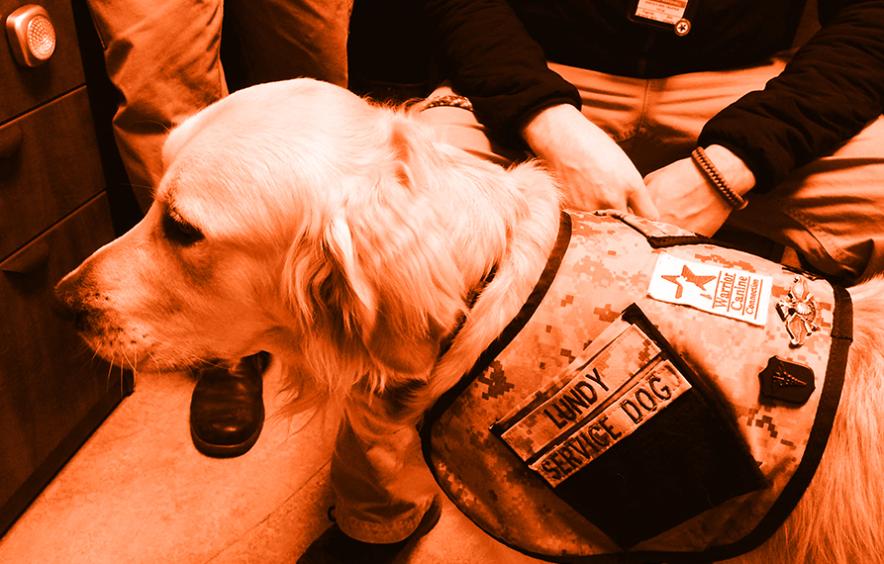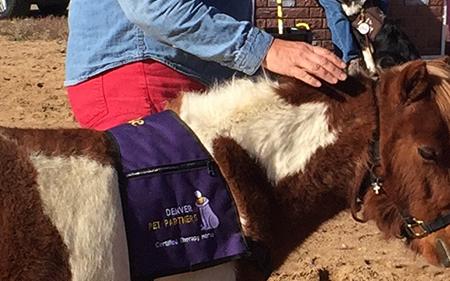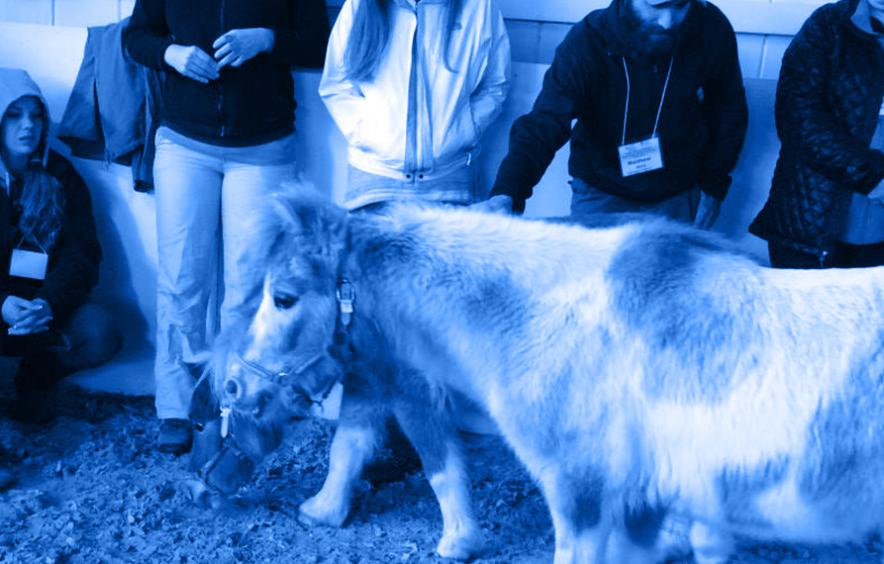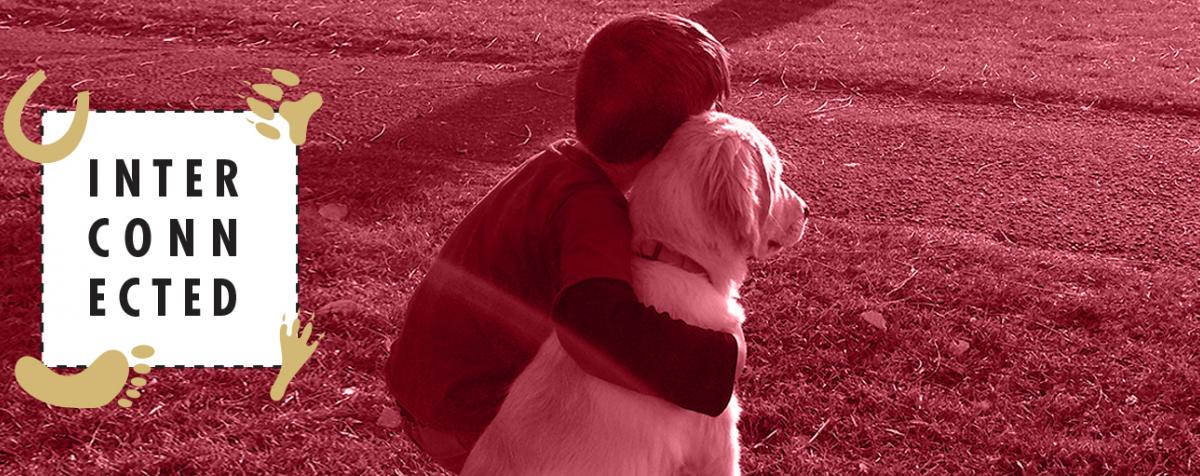Interconnected Webinar Series
Exploring the Human-Animal Bond
The Institute for Human-Animal Connection (IHAC) Interconnected webinar series explores the human-animal bond and its impact on public health and well-being. Webinar recordings, supporting materials and a certificate of completion to document one professional-development contact hour are available at no cost to current DU students, faculty and staff; sessions are $10 each for the general public.
Offered at no cost for all audiences, the “Why Humane Education?” webinar discusses the potential for humane education to help those impacted by animal cruelty and interpersonal violence, as well as resources for incorporating humane education into your practice.

Interconnected Part 1
Part 1 explores current systems and best practices related to prevention and intervention of Link violence (the relationship between animal abuse and interpersonal violence), including a review of the literature, reporting animal cruelty, sheltering animals and families together, and serving pets and people experiencing homelessness.
-
The Co-occurrence of Animal Abuse and Family Violence
When animals are threatened or abused
Since the mid-1970s there has been a growth in studies of the co-occurrence of animal abuse and family violence
Since the mid-1970s there has been a growth in studies and application exploring how animal abuse co-occurs with family violence. Presented by Allie Phillips, attorney consultant for IHAC, founder of Sheltering Animals & Families Together (SAF-T) and cofounder of Therapy Animals Supporting Kids, this webinar discusses some of the latest research so that agencies and staff assisting victims of crime are better suited to assist.
-
Reporting Animal Cruelty
What happens when animal cruelty is disclosed?
For agencies who are housing or assisting victims of domestic violence or talking with children
For agencies who are housing or assisting victims of domestic violence or talking with children who have experienced or observed abuse and violence, a disclosure of animal abuse or neglect may occur. This webinar discusses how animal cruelty is defined in Colorado, and if reported, who investigates, what the investigation entails and what to expect. This session is presented by Joe Stafford, director of animal law enforcement at the Humane Society of Pikes Peak Region, and Diane Balkin, former deputy district attorney and an attorney with the Animal Legal Defense Fund Criminal Justice Program.
-
Sheltering Animals & Families Together
An innovative global initiative for domestic violence shelters
The SAF-T Program was created in recognition that families who are abused often have pets
The SAF-T Program was created in recognition that families who are abused often have pets and do not wish to be separated from them when fleeing their abusive environment. Presented by Allie Phillips, attorney consultant for IHAC, founder of Sheltering Animals & Families Together (SAF-T) and cofounder of Therapy Animals Supporting Kids, this webinar details how to establish a SAF-T Program at your community domestic violence shelter, including housing options, safety protocols, funding and more.
-
Pets of Individuals and Families Experiencing Homelessness
Why most shelters for people are not housing pets
resented by Pets of the Homeless founder Genevieve Frederick, this webinar outlines why most shelters
Presented by Pets of the Homeless founder Genevieve Frederick, this webinar outlines why most shelters for people experiencing homelessness are not housing pets, discusses a new model that addresses that issue and shares resources for pets of people experiencing homelessness, including pet food and emergency veterinary care.

Dive deeper into animal-assisted interventions and more with professional development.

Interconnected Part 2
Part 2 is focused on tools for change, including understanding feline and canine communication and behavior, human-animal interaction laws, and Link-informed responses and coalitions.
-
Feline Communication and Behavior
Enhance communication with your cat
It’s important to understand what your cat is communicating in order to provide him/her with a safe environment
It’s important to understand what your cat is communicating in order to provide him/her with a safe environment. Presented by Marissa Martino, owner of Paws and Reward Dog Training, this webinar covers feline body postures and what they mean, teaches you how to strengthen your observation or “listening” skills and provides tools to help you keep cats safe and happy in a domestic violence shelter.
-
Canine Communication and Behavior
Enhance communication with your dog
It’s important to understand what your dog is communicating in order to provide him/her with a safe environment
It’s important to understand what your dog is communicating in order to provide him/her with a safe environment. This webinar covers canine body postures and what they mean, teaches you how to strengthen your observation or “listening” skills and provides tools to help you keep dogs safe and happy in a domestic violence shelter. Presented by Marissa Martino, owner of Paws and Reward Dog Training, this webinar is perfect for shelter staff to learn or refresh basic knowledge of dog behavior.
-
Advances in Human-Animal Interaction Laws
Laws that benefit people and animals
In the past decade, significant advancements have been made in human-animal interaction laws that benefit people
In the past decade, significant advancements have been made in human-animal interaction laws that benefit people and animals and promote stronger human-animal bonds. Presented by Allie Phillips, attorney consultant for IHAC, this webinar covers laws that address domestic violence pet protection orders, animal-assisted therapy and working-animal laws expanding to the criminal justice system, cross-reporting crime laws, laws to address pets in women’s shelters, and more.
-
Building a Successful and Sustainable Link Coalition
Reducing all forms of family violence
The advantages and challenges of organizing and sustaining a multidisciplinary coalition and a process for success
Renewed interest in how animal cruelty and neglect are frequently linked with domestic violence, child abuse, child sexual abuse, and elder abuse are prompting many communities to initiate multidisciplinary Link coalitions to reduce all forms of family violence. Presented by Phil Arkow, coordinator of the National Link Coalition, and Amber Ahern, founder/director of the South Florida Link Coalition, this webinar reviews the advantages and challenges of organizing and sustaining a multidisciplinary coalition and lays out a process to success.
-
Link-Informed Response: Changing Agency Procedures
Implementing a more Link-informed response
Changes in policies and procedures for a more Link-informed response
With growing awareness about the Link between violence to animals and people, human and animal welfare agencies—along with prosecutor offices, law enforcement agencies and allied professionals—are changing how they respond to Link-related cases and survivors. Presented by Allie Phillips, attorney consultant for IHAC, this webinar addresses policies and procedures to change or implement in agencies for a more Link-informed response.

Have questions about the Institute for Human-Animal Connection Interconnected webinar series?

Interconnected Part 3
Part 3 delves into the work of the Institute for Human-Animal Connection, including forensic animal maltreatment evaluation, humane education, emotional support animals and equine-assisted mental health.
-
Forensic Animal Maltreatment Evaluation & Animal Abuse Risk Assessment Tool
An evidence-informed approach to animal-cruelty cases
Crimes against animals reflect a wide array of behaviors and actions, and level of seriousness
Crimes against animals reflect a wide array of behaviors and actions, and level of seriousness; the underlying causative factors are also diverse. IHAC conducts comprehensive evaluations and assessments to better identify the underlying causes of animal cruelty and provide recommendations for treatment and supervision. Presented by IHAC Executive Director Philip Tedeschi, this webinar discusses the structure and need for these specialized evaluations.
-
Why Humane Education?
Human-human, human-animal and human-Earth bonds
Humane education demonstrates how human-human, human-animal, and human-Earth bonds can bring about deep
Humane education demonstrates how human-human, human-animal, and human-Earth bonds can bring about deep and lasting social, emotional, cognitive, physical, spiritual and psychological changes. Offered at no cost for all audiences, this webinar—presented by IHAC Director of Humane Education Sarah Bexell—discusses the potential for humane education to help those impacted by animal cruelty and interpersonal violence as well as resources for incorporating humane education into your practice.
-
Emotional Support Animals
Science, best practices and clinical considerations
There is much confusion regarding Emotional Support Animals (ESAs), despite their potential
There is much confusion regarding Emotional Support Animals (ESAs), despite their potential for improving the lives of people struggling with mental health. In this webinar, IHAC Executive Director Philip Tedeschi reviews the science of the human-animal bond as it relates to ESAs, best practices for ESA programming, clinical considerations for conducting an ESA evaluation with a client, and tips for offering emotional support animal prescriptions and generating ESA letters as documentation.
-
Equine-Assisted Mental Health
Interacting with Horses in Psychotherapy Services
There are a number of professionals who incorporate horses in the services they provide
There are a number of professionals who incorporate horses in the services they provide. Presented by IHAC Director of Equine Programs Nina Ekholm Fry, this webinar describes how psychotherapy and counseling practitioners can work with horses to help clients reach treatment goals. It clarifies what equine-assisted therapy is and is not and discusses future directions of the inclusion of horses in psychotherapy in areas of ethics, treatment effectiveness and professional competencies.
